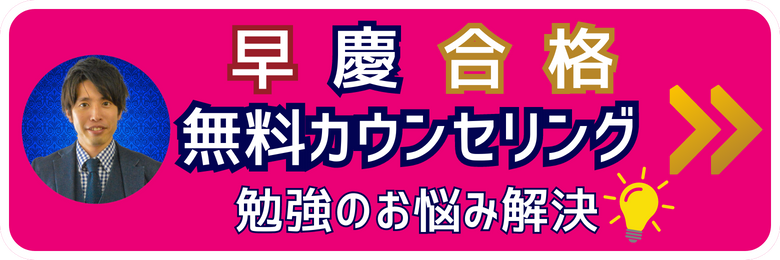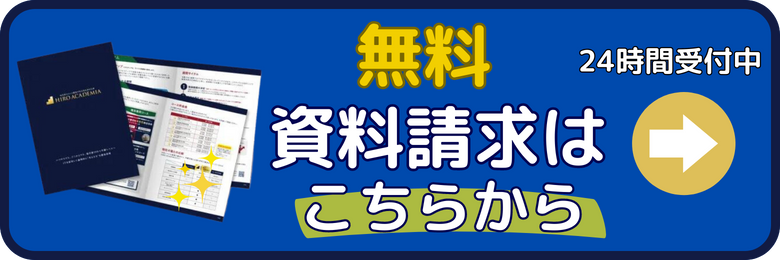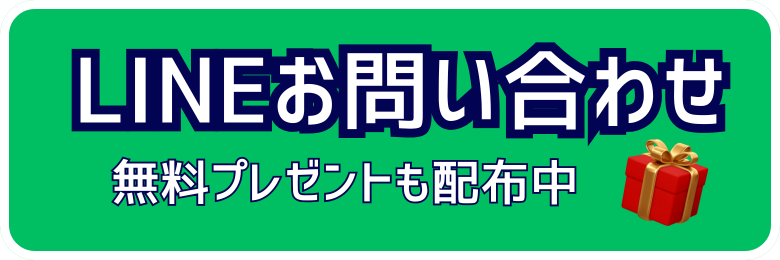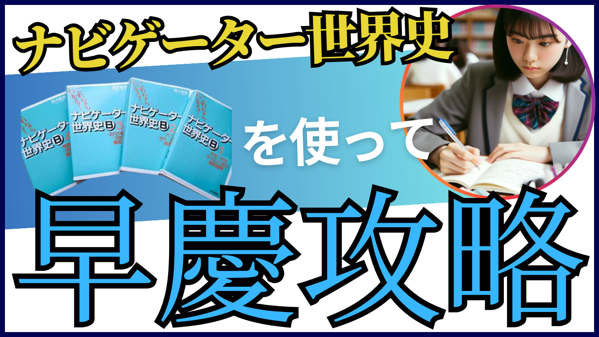早稲田文化構想学部学部の【世界史】対策・勉強法 このブログでは、早稲田文化構想学部の世界史に関する入試対策(出題傾向と勉強法)をご紹介していきます。 基礎知識0の状態から合格するためには何をどのようにしたら良いのかを参考書の使い方まで徹底解説! 本ブログ記事は早稲田文化構想学部の世界史についての対策
- …続きを読む
-
早稲田文化構想学部学部の【世界史】対策・勉強法
このブログでは、早稲田文化構想学部の世界史に関する入試対策(出題傾向と勉強法)をご紹介していきます。 基礎知識0の状態から合格するためには何をどのようにしたら良いのかを参考書の使い方まで徹底解説!
本ブログ記事は早稲田文化構想学部の世界史についての対策についての記事になります。
早稲田文化構想学部の配点や合格最低点他の科目についてはこちらのページをご覧ください。
[nlink url="https://hiroacademia.jpn.com/blog/taisaku/waseda/bunko/bunko-profile/"]早稲田文化構想の世界史の全体概観/傾向
時間配分は問題数がやや多いですが、早慶受験生にとっては標準的な問題ばかりです。
間に合わないということはないでしょう。
早稲田大学文化構想学部の世界史は大問数が多いのが特徴ですが、難易度は早稲田大学標準レベルですので、基本的な知識の習熟を徹底しましょう。早稲田文化構想世界史の配点と合格最低点
▷一般入試
教科 配点 英語 75 国語 75 地歴 50 合計 200 POINT
例年、合格最低点は130−135点前後となっています。少なくても世界史で30-35点程度は取れるようになる必要があります。

世界史は基礎的な問題も多いので、落とさないように気をつけよう!
早稲田文化構想の世界史対策|出題概要
問題形式は選択式がほとんどだが、記述問題も含まれる。
大問7~8題
やや西洋史重視ではありますが、中国史も頻出です。早稲田大学は学部全体で中国史が良くでているので注意してください。
早稲田文化構想対策1:勉強の進め方
早稲田大学文化構想学部は早稲田大学とはいえ、教科書レベルの基本的な問題が出題されます。世界史の勉強の際に大事なのはいきなり細かい部分の暗記から入らないことです。
まずは簡単なレベルでいいので流れをつかむのが肝心です。
[itemlink post_id="18288"]
そのためにはマンガがおすすめでしょう!
マンガで直感的にどのようなことか?という流れをつかんでから理解していくのが、基礎的な学力をつけていくには必要です。
まずは漫画で世界史の大枠を掴んでから細かい部分の暗記に移りましょう。どのような形で世界史の流れを掴んだら良いのか、
[nlink url="https://hiroacademia.jpn.com/blog/program/sekaishi-benkyo/"]
細かくはこちらの世界史の勉強法の記事で説明しています。早稲田文化構想対策2:文化史対策
早稲田大学文化構想学部では例年文化史からの出題があります。
この文化史の対策はどのようにしたら良いのでしょうか?
まずはじめにすることは文化史よりも通史を確実にしておくこと。文化史=暗記のように感じますが、文化史も通史と同じ流れで進んでいます。
この流れを理解できていないと文化史の理解が曖昧になってしまいます。ですから、まずは通史に重点をおいてみましょう。
その後にようやく文化史です。
文化史の流れを理解する

多くの受験生は文化史=ただの暗記と思ってしまいがちなのですが、
文化史にも流れが存在します。大きく分けて、人同士の流れと時の流れの二つに分けることができます。
■人の流れ
人の流れとは、友人の関係や師弟関係や家族関係などがあたります。
歴史上の人物をただの記号で考えるのではなくて、
どのような関係にあったのかを知っておくとわかりやすいです。また、それぞれの人物の出身地を確認することで、政治史との結びつきがわかります。
やみくもに「ショパン = 革命のエチュード」と覚えるだけでなく、ショパンはポーランド人、当時のポーランドはロシアに支配され、独立運動が盛んだったが失敗したという流れと結びつけることで覚えやすくなります。■時の流れの理解
時の流れというのは、時代ごとの背景ですね。
通史と連関してなぜこの文化が発生したのか?という部分を考えてみましょう。例えば、ルネサンスは「人文主義」といいますが、なぜ人間を中心に考えるようになったのかを考えてみましょう。
そうすると中世が人間中心でなかった=神が中心だったということがでてきます。
神が中心で亡くなったということは政治を考えるとどのような出来事からわかりますか?
ローマ教皇権を考えるとすぐに出てきますね。こうすると、なん世紀の出来事なのかということも覚えやすくなってきます。
上記のように暗記することでこれまでのような機械的な暗記から、
理解の暗記にすることができます。早稲田文化構想の過去の入試講評|2017年
[su_spoiler title="クリックで表示。ネタバレ防止のため隠しています" icon="plus-square-2"]昨年度と同じような問題傾向となっています。
ただし、昨年度難化していることを考えると、
一昨年以前より難しめの問題であったということも言えるでしょう。出題範囲も古代から現代まで出題されており、
文化史も非常に細かいところからも出題されている。文化構想学部では用語選択・用語記述問題が多い傾向でありますが、
もちろん正誤判定問題も出題されています。正誤判定問題も難易度は高く、
世界史のすべての範囲に精通していても高得点をとることは非常に難しくなっています。難易度の高い問題については他の受験生もできないと割り切って解くこと、
そのうえで知識が無くても問題文中からヒントを探し出し、
自分の持っている知識から考え、
消去法なども使って正解に近づいていく努力が必要となるのは昨年と変わりません。[/su_spoiler]
早稲田文化構想学部【世界史】で使える参考書
早稲田大学文化構想学部の世界史で使える参考書は、その他学部と同じようにナビゲーター世界史が良いでしょう。
[nlink url="https://hiroacademia.jpn.com/blog/program/sekaishi-benkyomap/"]
世界史の勉強法についてはこちらの記事で詳しく説明しているのでみてください。早稲田大学文化構想学部に圧倒的な実力で合格できる専門対策をします

まずは資料請求・お問い合わせ・学習相談から!
早慶専門個別指導塾HIRO ACADEMIAには、早稲田大学専門として文化構想学部への圧倒的な合格ノウハウがございます。
少しでもご興味をお持ちいただいた方は、まずは合格に役立つノウハウや情報を、詰め込んだ資料をご請求ください。
また、早稲田大学文化構想学部に合格するためにどのよう勉強をしたらよいのかを指示する学習カウンセリングも承っています。学習状況を伺った上で、残りの期間でどう受かるかを提案いたしますので、ぜひお気軽にお電話いただければと思います。















